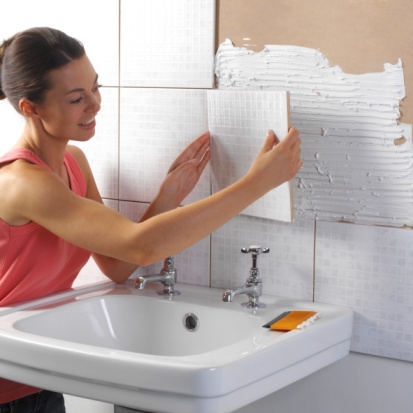Many homeowners are finding that making improvements to their home is cheaper and easier than moving to a new property. Government changes to planning permission also makes it a little less burdensome to enlarge your home. Joanne Atkin looks at some of the options and reminds people to update their insurance
Home improvements range from relatively simple touches such as refreshing the décor to increasing energy efficiency and making your home bigger. The most popular home renovation is fitting a new kitchen, closely followed by a new bathroom, according to research carried out by comparison website Gocompare.
But if you want to be even more adventurous you could increase the size of your property by building an extension or conservatory, converting the garage, loft or cellar, or even digging down and creating a basement space.
 According to research by Nationwide, a 10 per cent increase in floor space adds 5 per cent to the price of a typical home. Adding a bedroom and a bathroom through an extension or loft conversion can add up to 23 per cent to a property’s value. And if you create a second bathroom the value of the average home increases by 5 per cent.
According to research by Nationwide, a 10 per cent increase in floor space adds 5 per cent to the price of a typical home. Adding a bedroom and a bathroom through an extension or loft conversion can add up to 23 per cent to a property’s value. And if you create a second bathroom the value of the average home increases by 5 per cent.
Robert Gardner, Nationwide’s chief economist, commented: “Although location remains key to house values, other factors, such as the size of the property and the number of bedrooms it offers, are also important to homebuyers. Home improvements that increase floor area, such as an extension or loft conversion, therefore remain a good way to add value.”
The value added by increasing floor area to accommodate an extra bedroom
Type of house 2 bed to 3 bed 3 bed to 4 bed
Terraced 12% 10%
Semi-Detached 13% 10%
Detached n/a 9%
Permitted development rights
If you want to make minor changes to your house, such as a small one storey extension or a conservatory, you don’t necessarily need to apply for planning permission from your local authority. This is called ‘permitted development rights’ and the government has relaxed the law on planning permission to run between 30 May 2013 and 30 May 2016.
But there are various rules to this, such as the extension must be no more than half the area of land around the original house. Nor can it extend beyond the rear wall of the original house by more than three metres if it is a semi-detached or terraced property, or by four metres if a detached house. For the full specifications go to the government website at www.gov.uk/planning-permission.
The rules are different for flats, maisonettes and listed buildings; and there are restrictions if you live in a conservation area, a national park or an area of outstanding natural beauty.
It is always worth checking with your local authority whether you need planning permission.
The Planning Portal advises: “You should contact your local planning authority and discuss your proposal before any work begins. They will be able to inform you of any reason why the development may not be permitted and if you need to apply for planning permission for all or part of the work.”
Insurance
If you do make changes to your property, bear in mind that you may need to inform your insurance company, depending on what the changes are. Research by uSwitch has found that more than half (52 per cent) of those who have carried out extension work have not informed their insurer, which could potentially leave homeowners with an invalid insurance policy.
With one in ten (12 per cent) homeowners forced to scale-up their property as they can’t afford to move, uSwitch says people are shelling out an average of £15,000 to spruce up their homes.
Most buildings insurance policies are based on the structure of the house as it stands when the policy is taken out – so adding a new room or knocking through a load-bearing wall could affect the terms of the cover. Only 17 per cent of homeowners checked their insurance policy and contacted their provider before work began.
The research also reveals that consumers are failing to adequately protect their homes when the work is actually being carried out. Four in ten (43 per cent) did not take steps to arrange extra cover for accidental damage to possessions or the increased security risk of open walls or removing doors and windows.
Half of home improvers (49 per cent) failed to check whether their tradesman was certified, leaving themselves open to being short-changed. And seven in ten (71 per cent) prefer to pay contractors in cash whenever possible – but with no paper trail, homeowners will be left exposed if the job is not completed as promised.
Michael Ossei, personal finance expert at uSwitch, said: “If you are extending your home you are likely to be increasing the rebuild cost – so you will need to make sure this is updated with your insurer. Plus, if any external windows, doors or walls are removed during building work, you will be more vulnerable to burglaries, so you also need to make sure you are covered for this.
“It is also important to make sure the builders have public liability insurance to cover any accidental damage that happens during the work. With almost half of homeowners borrowing money in order to fund their building projects, the last thing you want is to get into extra debt if something goes wrong.”
Gocompare’s home insurance spokesperson, Mark Greening, added: “If you are planning extensive renovations and are thinking of moving out while the work is in progress, you need to be aware of your insurer’s rules regarding unoccupied properties. Most household insurance policies stipulate that if you leave your home unoccupied for a period of time, typically exceeding 30 or 60 day, then your property will not be covered for certain events including theft, malicious damage and escape of water.
“If you are employing tradesmen to undertake the work for you, check that they are qualified to carry out the work and registered with a recognised governing body. Most home insurance policies do not cover tradesmen or their work, so you should also check that they have their own insurance in place.”





I completely agree, an extension is a fantastic way of investing into your home as well as giving yourself a fantastic living space.
I agree, making improvements to the homeowners is better and cheaper than moving to a new property. Our home can increase energy efficiency and make home bigger through extension and renovation.